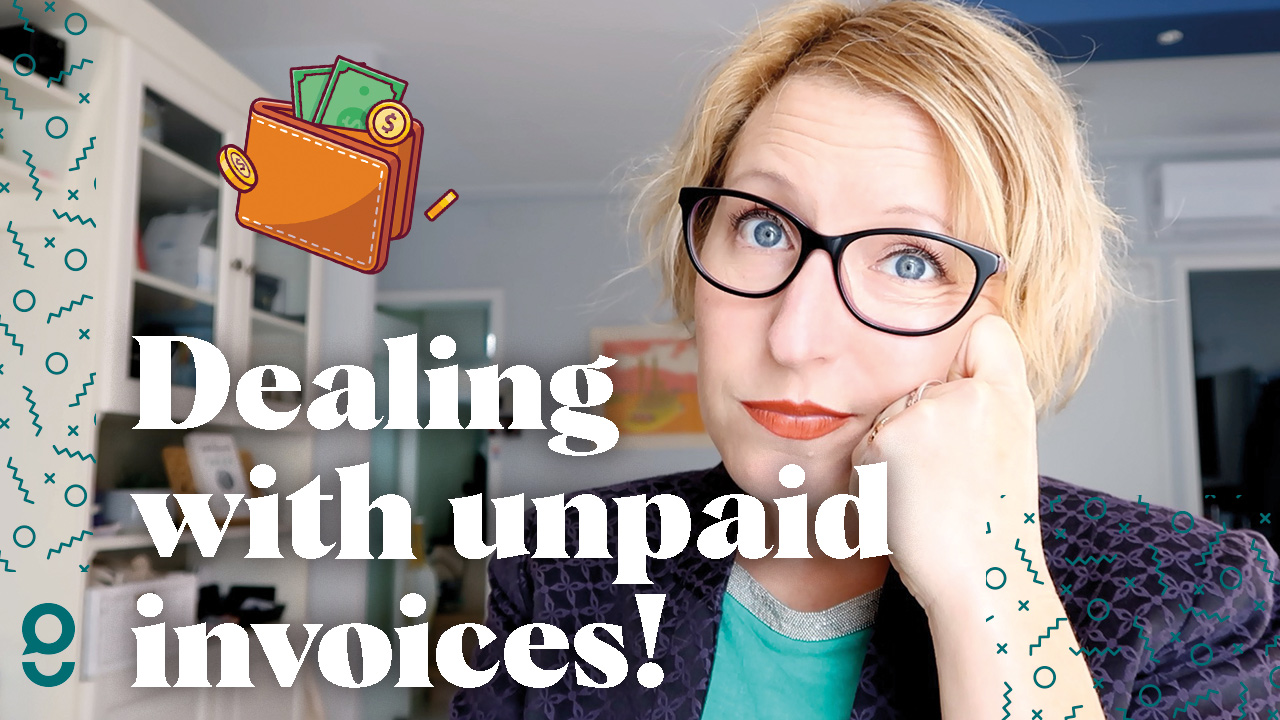
When you’re in business…and you don’t get paid, it’s a problem.
Whether you work for yourself, or for a company, getting paid is a key part of what your business does!
So when you’re doing business in English, you’ll need to know what to say to remind your client about an unpaid bill. Or follow up on an unpaid bill, as we sometimes say.
In today’s blog post, we’ll talk about how you can handle this potentially uncomfortable situation–in English.
You’ll learn specific expressions that will help you
- when a payment is late…
- And when you are following up after several reminders.
BUT before we learn those expressions, you need a strategy for handling stressful situations in English.
This is a strategy you can use not just for unpaid bills, but for many situations in a Business English setting.
We’ll talk about that first.
Index:
1. Managing stressful situations in English: Start with a strategy.
2. Following up on unpaid bills: What to say when a client misses a first payment
3. Following up on unpaid bills: When a bill is very overdue.
1. Managing stressful situations in English: Start with a strategy!
As a Neurolanguage coach, I know that when there is more pressure, it can feel like your level of English is not as good as usual! That makes it even harder to do a good job.
So it’s important to prepare your strategy in advance. It will help you deal with more challenging situations. I’m going to share some of the advice I give my clients when they’re going into a possibly stressful situation in English.
That way, you’ll go into the situation with more confidence and keep the conversation calm and professional. Everybody wins!
Here’s my advice as a Neurolanguage coach:
Use short and simple sentences.
Why? It makes it easier on you as you are speaking. But it also makes it easier for the person you are speaking to understand.
We live in an international business environment. And the people you are doing business with may not speak English as their first language!
In addition, we all have accents–you do, I do, your business partner in the UK, or India… Keeping your phrasing short in more difficult conversations makes the conversation easier to understand–for everyone!
Slow down!
Sometimes my clients think that being fluent means speaking quickly.
And…if we’re feeling a little nervous or uncomfortable, of course, we tend to speed up!
But in challenging situations, slowing down when you are speaking is a great idea.
It gives you more time to find your words.
It makes you seem more calm and confident.
It helps the person you’re speaking with relax.
And–in our international business environment–it helps make sure we all understand.
Learn what to say!
When I work with clients on more difficult conversations, they often find that knowing the most important phrases–the ones you know you will say–can help a lot.
And no, you can’t memorize an entire conversation–or predict what your client will say.
But knowing a few important expressions–very well can help you stay calm and sound and feel more professional and confident in your conversations.
Let’s learn a few now!
Also check out my lesson: A Neurolanguage Coach’s specific plan, to go from “ok English” to fluent Business English
2. Following up on unpaid bills: What to say when a client misses a first payment.
Of course, you’ll want to remind your client or follow up on the missed or late payment.
And they may have simply forgotten.
Here is an example of what you could say in this situation. To hear me use these phrases just like I would if I were calling a client, be sure to check out the video.
You could say something like this:
“Hello, this is Christina from Awesome Company.
I’m calling regarding the invoice for July.
The payment was due on August 15th.
It looks like we still haven’t received your payment.
Please let me know if you need me to resend the original invoice.”
Notice these very diplomatic expressions:
“It looks like” or “It appears that…”
You are actually saying–according to my records. Or based on the information I have.
It gives the person you’re speaking with a chance to confirm the information.
Or to provide you with more information–the payment number, for example.
Sometimes the payment may already be sent–or started.
If you’re sending paper invoices and receiving checks we might say:
“The letters crossed in the mail!”
If you need to double-check your records to be sure they made the payment, you can ask :
“Could you please tell me the date you sent the payment?”
To ask when you can expect to receive a payment you can say:
“Could you tell me when the payment is scheduled?”
This way, you know the payment has been sent or scheduled.
And you know when you can expect it to arrive–in case you need to follow up with them again!
Also check out my lesson: Negotiations in English: a practice dialogue for you + 9 phrases to learn today.
3. Following up on unpaid bills: When a bill is very overdue.
Depending on your line of work, you may have to follow up on a payment that is several months late.
And several reminders may have been sent already. This will depend on your situation and your company’s situation.
But here is an example to get you started:
“Hello, this is Christina from Amazing company!
I’m calling regarding an invoice that is currently past due.
It looks like we’ve already sent two reminders.
And we still haven’t received your payment.
If this is an oversight, please make sure a payment is made by September 10th.”
You’ve got this!
Reminding a client or customer that their bill is past due has the potential to be a difficult situation. But I’m sure you can handle the situation like a professional if you
- go into the conversation with the right strategies for staying clear, and confident
- learn the phrases you need to get you started.
And what if you realize your situation is more complex? Or what if you have to follow up on a lot of overdue bills, like some of my past clients?
In that case, you may need help and practice that is more specific to your situation.
Also check out my lesson: Master these 4 essential business situations and feel confident working in English.
Take the next step: Improve your English in the comments
The best way to become more confident using Business English is to practice!
Here’s your Confidence Challenge for this week:
- What would you say to a client who has a bill past due? Can you write it in the comments?
- Now practice saying what you wrote in a slow, confident way.
If you learned something from this lesson, please share it with your coworkers & friends. You can send your message to them in English for more practice!
Click here to share this article on LinkedIn
Click here to share this article on Facebook
Become more fluent & comfortable in conversations
If you would like to take the next step with me, discover my Faster Fluency Conversation Club Membership Program!
It helps you become more confident speaking in conversations, and get a lot more vocabulary on many different topics! And it’s a fabulous community of “English buddies” from around the world!
TIP: Use the code FFCC40 to save -40% off your 1st month of membership!
More details at https://christinarebuffetcourses.com/faster-fluency-conversation-club/join-now
Can’t wait to see you in the Club,
Christina
More good stuff…
Click the image to learn more








Fortunately, I never needed to deal with any follow ups. When my client is past due on their invoices, I sent them a message reminding them of the date and, so far, they have made the payment right away.
Sounds like you have amazing clients, Samile!